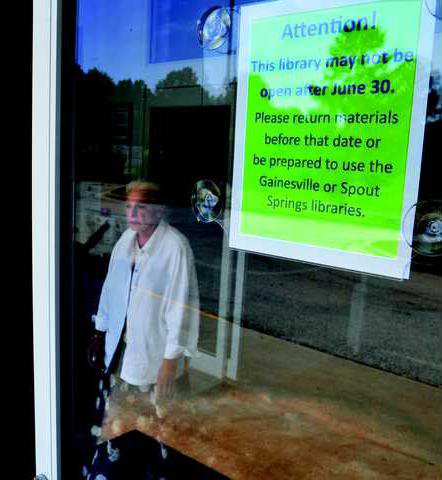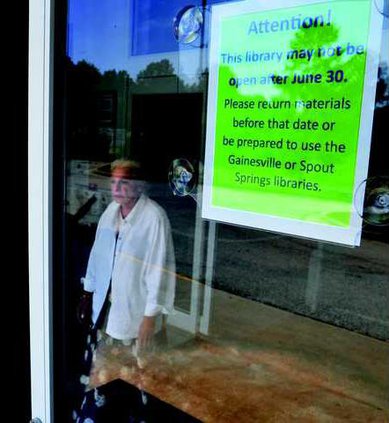Opportunities to comment on budget
Board of Commissioners Budget Public Hearing
When: 6 p.m. Thursday
Where: Georgia Mountains Center, 301 Main St., Gainesville
Commission District 4 budget discussion
When: 9:30 a.m. June 11
Where: Fair Street Neighborhood Center, 715 Fair St., Gainesville
Board of Commissioners Regular Meeting
What: Scheduled to approve budget
When: 6 p.m. June 23
Where: Georgia Mountains Center, 301 Main St., Gainesville.
Additional public hearings will be scheduled if commissioners decide to consider a tax increase.
What do you think?
The Times wants to know what our readers think of the county's proposed budget and Chairman Tom Oliver's idea to raise taxes to offset some of the budget cuts. Send us your comments by email to letters@gainesvilletimes.com or mail them to P.O. Box 838, Gainesville, GA 30501. Include full name, hometown and phone number for confirmation. Submitted items may be published in print, electronic or other forms.
Related story: Hall County residents react to proposed budget cuts.
Hall County's proposed 2012 budget would slash spending by closing nearly all county parks and four of its six libraries to make up an $11.5 million deficit.
The proposed $85.9 million budget would also eliminate two of 16 ambulances and lay off 77 employees while cutting another 25 open positions and trimming benefits for other workers.
"The cumulative effect of the economic downtown over the past three years has forced us to shrink the government," said Nikki Young, the county's spokeswoman, on Thursday.
"At this point, we have to pick and choose what to cut."
To offset the deep cuts, Hall County Board of Commissioners Chairman Tom Oliver has proposed a 1.41 mill tax increase. Such a move would generate an additional $8 million in revenue, leaving many services intact and cutting 55 positions. Commissioners would still need to find $3.5 million in cuts, even with a tax increase.
On a home valued at $180,000, property taxes under Oliver's proposal would rise $101 for the year. One mill is equal to $1 for each $1,000 in assessed property value.
"Once we start closing libraries and parks ... laying off firemen and some of the others ... (and) doing away with matching 401(k), we're going to end up with a county that we're not going to recognize nor like," Oliver said.
"At this time, I understand I'm a minority on the commission for wanting a tax increase and millage roll-up, but I think (that) one of these days, if we do not have it, we will not like the county we're seeing."
South Hall Commissioner Craig Lutz said he opposes a tax rate hike out of concern for businesses.
"Having talked to a lot of constituents, I can tell you that there are a lot of people in this county who cannot afford a dollar more in taxes," Lutz said. "We're in a situation now where we have to make a choice. Is the county going to be competitive in trying to find employers to come here to grow out of this problem, or are we going to penalize the people who are already here?"
North Hall Commissioner Scott Gibbs, speaking Thursday night at a public hearing in Clermont on the budget, said, "I'm definitely not voting for a millage rate increase. ... We've got to get down to providing what we have to provide, not what we want to provide.
"We're going to have to get back to essentials."
The budget, as proposed without a tax increase, would eliminate funding for Chicopee Woods Agricultural Center on Calvary Church Road on July 1, the first day of the new budget year. Young said events scheduled at the center after July 1 likely would be canceled.
Also, Parks & Leisure Services' budget would be cut by 78 percent. Final cuts haven't been made, but officials have hinted that only school ballfields and the Allen Creek Soccer Complex would be maintained.
"When you've got to make heavy cuts, quality of life, unfortunately, is what is expendable," Young said.
Under the proposal, the emergency medical services also would be cut by 10.36 percent, meaning two fewer ambulances on the streets.
Hall County Fire Chief David Kimbrell said two fewer ambulances will lead to inferior emergency medical services and delays in response times.
"The number of calls is not going down," he said. "We will just have less people to answer them. There are going to be times people are just going to have to wait. I don't think it's a good place to cut. There will be service issues to the citizens."
Oliver said such a cut would put residents' lives at risk.
"I think it would be devastating," Oliver said. "What's the value of 10-20 minutes for emergency services? That could be someone's life."
Lutz agreed this may be one area where cuts went too far.
He said if the commission decides it would jeopardize citizens, they'll find another place to make less costly cuts.
As for parks and community centers, the county commission will make the final decision about which facilities will be closed, Young said.
Oliver said he believes "it's a shame" Hall County is "going to be known as the county with limited tee-ball, limited Little League, limited soccer because (of) the facilities that we don't have and we're shutting down.
"I don't think that's a positive for our area."
Greg Walker, parks director, and Tommy Evans, the parks board chairman, couldn't be reached for comment on the potential budgetary effects on youth sports and other parks services.
Parks & Leisure board member Sam Chapman, who also serves on the Chicopee Woods Agricultural Center Advisory Board, said he can relate to the county's financial struggles.
He sees them as a member of the Hall County Board of Education, which is also having a tough budget year.
But he was disappointed to hear about no funding next year for the center, a 45-acre complex featuring a 1,700-seat covered arena.
"I think that every group, every department should share in the prosperity and when we don't have the prosperity," Chapman said. "It shouldn't be left with one group to get hammered."
The library system's budget is also looking at a 20 percent decrease, possibly placing the Blackshear Place, East Hall, Murrayville and Clermont libraries on the chopping block. The Gainesville and Spout Springs locations are expected to stay open.
Adrian Mixson, Hall County Library System director, said the cuts pull funding away from an already limited library budget.
In 2010, Hall County provided $14.24 per capita to the system. The national average of local funding is $31.94 and the state average is $16.54, according to statistics provided by the Georgia Public Library Service.
"You take that much money from our budget, something has to give," said Adrian Mixson, director of the Hall County Library System. "We're at the point where the only thing that gives is people. If we don't have people, it's kind of hard to run buildings."
Mixson addressed the subject Thursday in the Friends of the Hall County Library's summer newsletter.
"Now it is time for you to decide what local services are important and let your feelings be known," Mixson wrote.
"... It could be we are at a turn where libraries and parks are no longer essential."
Lutz said these are hard choices that must be made.
"Every single cut that we're making, in my mind, is taking a service away from the people. I don't think any of those are good," he said. "We have to balance out the necessities versus the niceties.
"While libraries, I feel, provide a valuable service to our community ... we really have to weigh that against safety and life-saving measures. ... Basically what (the library cuts) mean to people, is that they are going to have to drive a little farther to go to a library."
Signs have been posted at several libraries warning residents they may not be open after June 30.
"We can't dally around anymore," Mixson said. "I felt it was a responsibility on my part to let our patrons know there may be some really serious changes coming to the library system and not wait till a new budget year ... and July 1, low and behold the doors are shut."
A public hearing on the budget will take place at 6 p.m. June 9 during the commission's regular meeting at the Georgia Mountains Center. Two additional hearings will be scheduled if a tax increase is proposed.
In the meantime, other commissioners will be scheduling hearings so they can receive input from the community, Lutz said.
"We represent the public here, so we really shouldn't ever make a decision without getting public input," he said.
"Overall, considering what staff had to work with, I think they have presented us a good starting point. ... Now it's going to be up the commissioners to decide where to go."

